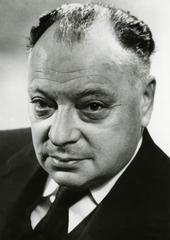Wolfgang Pauli
Credit: Bettina Katzenstein / ETH Zürich [CC BY-SA 3.0]
Wolfgang Ernst Friedrich Pauli was born on 25 April 1900 in Vienna. He studied physics in Munich where he received his doctoral degree under the supervision of Arnold Sommerfeld in 1921. The following year he was an assistant of Max Born at Göttingen, and he visited the University of Copenhagen, invited by Niels Bohr. From 1923-1928 he taught physics at the Universität Hamburg, and in 1928 he moved on to a professorship at the Eidgenössische Technische Hochschule (ETH) in Zurich. From 1940-1946 he was a visiting professor at the Institute for Advanced Study at Princeton, New Jersey. He then returned to Zurich where he died on 15 December 1958.
During Pauli's years in Hamburg, quantum mechanics was invented, and Pauli was one of the key players in this process, in close contact and collaboration with Bohr, Born, Heisenberg and others. This period was scientifically very fruitful, with pioneering work on the anomalous Zeeman effect, electron spin and Pauli equation, and the electron gas in metals. In 1925 Pauli published his work on the "exclusion principle" for which he was awarded the Nobel prize 20 years later.
Wolfgang Pauli strongly influenced the development of theoretical physics not only through his scientific publications, but also through his extensive correspondence and personal relations with leading scientists around the world. His critical intellect and mathematical rigor were generally admired, as expressed by Isidor Rabi: "Kind, forthright, and of uncompromising principles he was the conscience of physics".


